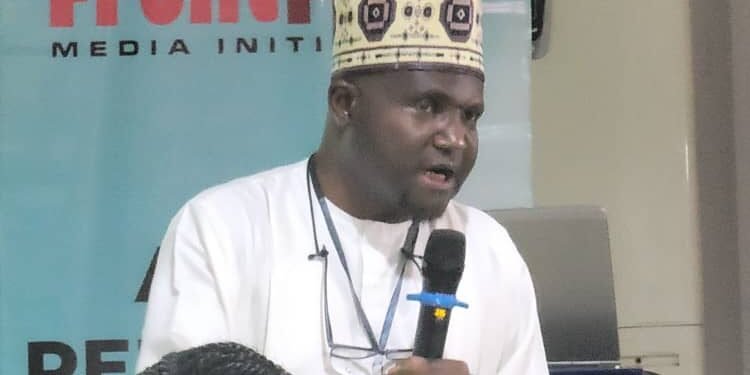By Seyi Babalola
Nigeria should consider a constitutional amendment making an annual laying of the federation’s account before the National Assembly compulsory.
This, according to the proponent, should be done same way the annual national budget proposals are laid before the National Assembly.
These were the highlights of the presentation of former president of the Institute of Charted Accountants of Nigeria (ICAN), Ismaila Muhammadu Zakari.
Zakari made the call Thursday, 23 October 2023, at the Audit Reporting Workshop organised by FrontFoot Media Initiative, a non-governmental organisation.
Zakari proposed that the constitutional amendment must compel the Accountant General of the Federation to prepare the annual accounts within 90 days of the end of the accounting year.
“He must then send it to the Auditor General who spends a further three months to prepare and send it to the National Assembly”, he added.
Zakari also said that compelling the President to lay the annual accounts before the National Assembly would instil greater accountability.
Recall that the Federal Government has not had audited accounts since 2019. Nigeria also had no Auditor General in the period.
President Bola Tinubu has nominated Mr. Shaakaa Chira to serve as Auditor-General of the Federation and forwarded it to the National Assembly for confirmation.
The National Assembly can confirm or reject the President’s nominee. The Senate Committee on Public Accounts usually conducts the process.
The committee will hold a hearing where they will ask the nominee questions about their qualifications and experience and review his background and any potential conflicts of interest.
Former president Muhammadu Buhari did not nominate a replacement Auditor-General since 2019. However, the audited statement of 2019 indicted the Federal Government on several counts.
At the workshop, financial expert and CEO of The CFG Advisory, Mr Tilewa Adebajo, underlined the significance of the audit report. “The budget is only a projection. The audited account is the reality.”
The 2019 Federal Government Audit Report revealed a number of irregularities and shortcomings, including:
• Unapproved payments: The Auditor-General found that the Federal Government made a number of unapproved payments in 2019, totalling over N200 billion. These payments, according to him, were not supported by the necessary documentation and may have violated the country’s Public Procurement Act.
• Missing funds: The Auditor-General also found that over N100 billion could not be accounted for in the Federal Government’s 2019 financial statements. This suggests that the funds may have been misused or stolen.
• Weak internal controls: The Auditor-General found that the Federal Government has weak internal controls in place, which makes it difficult to prevent and detect fraud.
In addition to the above, here are some other highlights and recommendations from the 2019 Federal Government Audit Report:
• The report found that the Federal Government’s revenue collection efforts were weak, resulting in a significant revenue shortfall. The Auditor-General recommended that the government improve its revenue collection efforts by expanding the tax base, streamlining tax administration processes, and cracking down on tax evasion.
• The report also found that the Federal Government’s expenditure on non-essential items was excessive. The Auditor-General recommended that the government reduce its expenditure on non-essential items and focus on spending on essential services such as healthcare, education, and infrastructure.
• The report also found that the Federal Government’s debt stock was rising rapidly. The Auditor-General recommended that the government develop a comprehensive debt management strategy to ensure that its debt is sustainable.
The Audit Reporting Workshop held at the GulfView Conference Center and Suites, Ikeja GRA as the fourth in the series. Earlier workshops were in Benin, Awka and Abuja.
Emeka Izeze, director and partner, said the Audit Reporting Training: X-raying State Government Audit Reports is a flagship capacity development programme of FrontFoot Media Initiative.
“It is a targeted training of journalists which we are undertaking under the auspices of the Wole Soyinka Center for Investigative Journalism and the sponsorship of the MacArthur Foundation,” Izeze affirmed.










